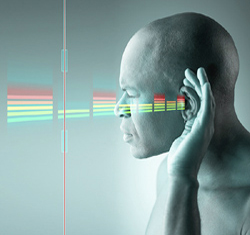
The human auditory system is the most powerful analyzer that we have at our disposal. It is a two-channel, frequency-dependent, localizing data collection system with on-board algorithms that give it subjective perception. Even the most powerful analyzers can only emulate a few of these characteristics.
Two Shortcomings
The importance of the listening process in tuning sound systems should not be underestimated. In spite of its strengths, our hearing system has two serious shortcomings with regard to adjusting the sound system’s response: it is not calibrated, and it is not consistent.
The lack of calibration means that we cannot listen to a sound and state with accuracy how loud it is. At best, we can offer a subjective impression of “pretty loud,” “ear-splitting,” etc.
Even a highly trained listener has difficulty identifying an absolute sound level to within 3 dB of its true level, which is a power ratio error of 2-to-1. So, if you guessed that the SPL were 87 dBA, and you were off by 3 dB, you missed by a 2-to-1 power ratio—a pretty large error! Absolute level measurements are trivial for analyzers—most of which can measure sound levels to within a fraction of a decibel.
The response of the human auditory system is not consistent. It changes with exposure, which means that after you listen to loud sounds for a while, the characteristics of your hearing system change.
The stapedius tendon (try saying that three times fast!) attaches to the bones of the middle ear and dampens their motion when your ears are exposed to loud sounds over a span of time. So, what sounds fine early in the show is not likely to sound the same by the end. This “threshold shift” is nature’s way of protecting us, but as with all protection mechanisms, it can be circumvented.
We’ve all experienced performances that get louder as the evening wears on. This is caused by the sound operator tracking the threshold shift with the main fader of the system. Visual feedback (the meter’s mixer) can prevent this from happening. This is, of course, a measurement. Humans are subject to listener fatigue, a condition that makes it very difficult to listen objectively after prolonged exposure to sound at any level.
A good night sleep will “reset” our hearing system and render us capable of critical listening. Analyzers have no such malady. They don’t get tired as the day wears on. So when the analyzer and your brain start to disagree, it may be time for a rest.
Reality Distortion?
We work in an industry where a lot of money is made by distorting reality. You can drop a thousand dollars on a processor that essentially increases the harmonic distortion of your system or fills its response with deep notches, and feel like you have improved its sound quality.
